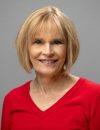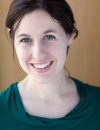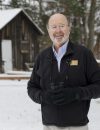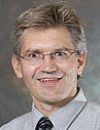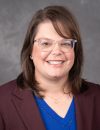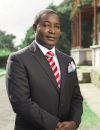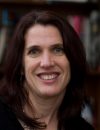New guidance from the Centers for Disease Control and Prevention encourages Americans to make their masks work better by tightening their fit, including by using a simple, homemade tool designed at the University of Wisconsin-Madison.
UW In The News
-
White House bets on counter programming Trump impeachment
But Barry Burden, director of the University of Wisconsin-Madison’s Elections Research Center, was confident Biden was playing his strongest hand since his campaign was “a pitch for national unity and a return to normalcy.”
-
Opportunity in America starts with fixing the internet, says social investing pioneer
Streur pointed to a new study from the University of Wisconsin-Madison that shows how COVID-19 has made life in rural and low-income communities in Wisconsin, which ranks 38th for internet access out of all 50 states, even harder without broadband.
A team of university researchers led by Tessa Conroy found that even before the pandemic, those on the winning side of Wisconsin’s “digital divide” often had higher home values, improved health outcomes, better entrepreneurship opportunities and higher educational outcomes than those living without fast internet.
-
Poem: Smokey
Born and raised in Compton, Calif., he is a professor of English at the University of Wisconsin-Madison, where he directs the M.F.A. program in creative writing. His latest collection, ‘‘Imperial Liquor,’’ was published by University of Pittsburgh Press in 2020 and nominated for a National Book Critics Circle Award in poetry.
-
New CDC guidance on masks cites UW-Madison invention, research
-
How Right-Wing Radio Stoked Anger Before the Capitol Siege
“It’s like your friend in the bar,” said Lewis A. Friedland, a professor who studies talk radio and politics at the University of Wisconsin-Madison, where stations serve up six or more hours of right-wing talk a day. “He’s your buddy, and he’s kind of like you and he likes the same kind of people that you like and doesn’t like the same kind of people that you don’t like.”
-
CDC urges to double mask or to wear masks that fit
David Rothamer, an engineering professor at the University of Wisconsin Madison, has experimented with masks on mannequins in classrooms while studying the best ways to prevent the spread of the virus in college classes. He said he is not a proponent of double masking because it consumes more masks, and can also lead to more air leakage.
-
Ikea’s Ambitious Plan To Make Its Cheap Furniture Last Forever
“Ikea is fairly unique in its ability to tell a potential supplier, ‘If you can’t meet our terms, we’ll find someone else who will,’” said Tom Eggert, a senior lecturer on business sustainability at the University of Wisconsin-Madison. “Whether it’s a wood alternative or plant-based plastics or something else entirely, they have the buying power to create a market where one may not yet exist.”
-
How vaccinating monkeys could stop a pandemic
They’re also useful. “Júlio [Bicca-Marques] likes to say that monkeys are like the canary in the coal mine,” says Karen Strier, anthropology professor at the University of Wisconsin-Madison and a career-long researcher of primates in Brazil. “They’re a good warning that you have to worry about yellow fever” – and other diseases, too.
-
Ready for takeoff: Three simple guidelines for flying after vaccination
It will take years until all air travelers are immunized, but we do not have to wait years until it is safe to fly.
-Dr. Laura A. Albert is a professor of Industrial and Systems Engineering at the University of Wisconsin-Madison in the College of Engineering and a Fellow of the American Association for the Advancement of Science. She is a prominent member of INFORMS. Her research applies optimization and analytical methods to public sector applications including aviation security.
-
The Mysterious Cause of a Deadly Illness in Sanctuary Chimps Revealed
“It was not subtle—the chimpanzees would stagger and stumble, vomit, and have diarrhea, sometimes they’d go to bed healthy and be dead in the morning,” says Tony Goldberg, a disease ecologist at the University of Wisconsin-Madison, to Ann Gibbons for Science.
-
McDonagh completing degree during breaks in Lightning schedule
Ryan McDonagh isn’t just lacing up his skates this season. He’s also hitting the books.
The Tampa Bay Lightning defenseman is working on getting his bachelor’s degree in personal finance at the University of Wisconsin via online learning. He left Wisconsin in 2010 after his junior season, just 18 credits short of the finish line, and signed a contract with the New York Rangers.
-
Pandemic offers Lightning’s Ryan McDonagh opportunity to finish his degree
Lightning defenseman Ryan McDonagh has found a way to make the most out of the new normal brought on by the coronavirus pandemic. He’s finishing his college degree.
McDonagh, who is 18 credits short of getting his personal finance degree from the University of Wisconsin-Madison, is now taking online classes to put himself on a path to graduate.
-
House Exiles Marjorie Taylor Greene From Panels, as Republicans Rally Around Her
Removal from committees is usually reserved for lawmakers who are facing indictments or criminal investigations or who have otherwise broken with their party in a particularly egregious way, according to Eleanor Neff Powell, a professor of political science at the University of Wisconsin-Madison.
-
Rescue dog breeds take DNA tests for the Puppy Bowl on Super Bowl weekend
But as some experts put it, defining doggie ancestry can be tricky. “To a large degree, the accuracy of breed composition tests very likely depends on the degree to which a dog is ‘mixed,’” Lauren Baker and Susannah Sample, both of the School of Veterinary Medicine at the University of Wisconsin-Madison, wrote in an email to PopSci. “From a veterinarian’s standpoint, we find these ‘breed identification’ tests are fun for many owners. But having not been evaluated by the scientific community, they shouldn’t be used to alter medical decisions.”
-
Chimps first, then humans? Scientists worry about new fatal bacterium.
“There are very few pathogens that infect chimpanzees without infecting humans and very few pathogens that infect humans without infecting chimpanzees,” said Tony Goldberg, one of the authors of the paper and a University of Wisconsin-Madison professor of epidemiology.
-
Chimpanzee-Killing Disease Linked by Researchers to New Species of Bacterium
Led by researchers from the University of Wisconsin-Madison, the disease was reported on February 3rd in the journal Nature Communication.The study suggests that the disease is caused by a newly discovered bacterium that comes as the world struggles with the onslaught of the COVID-19 pandemic.
-
As world reels from coronavirus, UW researchers report on chimpanzee-killing disease, raising concerns about jump to humans
A new and always fatal disease that has been killing chimpanzees at a sanctuary in Sierra Leone for years has been reported for the first time by an international team of scientists led by researchers at the University of Wisconsin-Madison.
-
Parting The Clouds
A professor of psychiatry and human ecology at the University of Wisconsin–Madison, Raison believes depression isn’t a single thing but a cloud of related mental and physical states unique to each person; there is no one symptom that every depressed person experiences. “It’s all kind of hunt-and-peck,” he says. “We have an array of treatment options that we just start throwing at people because we don’t know why, biologically, they’re depressed.” Meanwhile depression is growing to epidemic proportions in the United States, with few truly novel treatments approved over the last three decades.
-
A mysterious disease is killing chimps in West Africa. Scientists may now know the culprit
Disease ecologist Tony Goldberg was stunned in 2016 when he learned that a mysterious infection was swiftly killing chimpanzees at a lush sanctuary in Sierra Leone’s rainforest. “It was not subtle—the chimpanzees would stagger and stumble, vomit, and have diarrhea,” recalls Goldberg of the University of Wisconsin, Madison. “Sometimes they’d go to bed healthy and be dead in the morning.”
-
Lethal Chimp Disease Is Linked to Newly Identified Bacteria
In 2016, Dr. Goldberg, an epidemiologist and veterinarian at the University of Wisconsin, Madison, and head of the Kibale EcoHealth Project, was approached by the Pan African Sanctuary Alliance to try to solve the mystery. He and his colleagues at Wisconsin joined forces with other veterinarians and biologists in Africa and elsewhere to undertake a comprehensive analysis of blood and tissue from the dead chimps that had been frozen at a nearby hospital.
-
Pathogen Discovered That Kills Endangered Chimps; Is It a Threat to Humans?
But cases kept coming. In 2016, the Pan African Sanctuary Alliance, an umbrella organization for the continent’s primate sanctuaries, reached out to epidemiologist Tony Goldberg, Owens’ advisor at the University of Wisconsin–Madison. Goldberg was immediately intrigued. “This is an unknown infectious disease that poses a serious risk to the health and survival of an endangered species, which happens to be our nearest relative,” he says.
-
UW nursing, pharmacy students join effort to bring vaccines to rural areas
Over 200 University of Wisconsin nursing and pharmacy students have volunteered to help administer COVID-19 vaccines at statewide mobile clinics in local high-need areas.
-
The Webb Telescope, NASA’s Golden Surfer, Is Almost Ready, Again
Feature billing goes to researchers like Jill Tarter of the SETI Institute, a pioneer in the search for extraterrestrial civilizations; Natalie Batalha of the University of California, Santa Cruz, a leader of the Kepler mission who is now planning Webb observations; Margaret (Maggie) Turnbull, an expert on habitable planets at the University of Wisconsin, and a former candidate for governor of that state, whom Mr. Kahn interviewed as she tended her backyard beehives; and Amy Lo, a Northrop engineer who works on racecars when she is not working on making all the Webb pieces fit together.
-
In early going, Biden floods the zone with decrees
“A lot of what he has done has been unwinding what Trump had done,” said Kenneth Mayer, a University of Wisconsin-Madison political scientist and expert on presidential powers and executive actions. “Virtually all presidents push the envelope and do things that expand the scope of executive authority.”
-
Five reasons why researchers should learn to love the command line
Christina Koch, a research computing facilitator at the University of Wisconsin–Madison, works at a computing centre that provides remote access to some 14,000 nodes and terabytes of memory. Suppose, Koch says, that a bioinformatician has a computational workflow for analysing gene-expression data sets. Each data set takes a day to process on their computer, and the researcher has 60 such data sets. “That’s two months of non-stop running,” she says. But, by sending the job to a computer cluster using the ‘secure shell’ command, ‘ssh’, which opens an encrypted portal to the remote system, the researcher can parallelize the computations across 60 computers. “Instead of two months, it takes one day.”
-
In early going, Biden floods the zone with decrees
“A lot of what he has done has been unwinding what Trump had done,” said Kenneth Mayer, a University of Wisconsin-Madison political scientist and expert on presidential powers and executive actions. “Virtually all presidents push the envelope and do things that expand the scope of executive authority.”
-
American Hegemony Is Ending With a Whimper, Not a Bang
Today, in the era of a 78-year-old president, a veritable Rip Van Biden, Americans and the rest of the world are, it seems, waking up in a new age. It could well be a daunting one.Invest your way with Schwab.From automated investing to financial consultants, get tools and resources that match your needs.
-Alfred McCoy is the J.R.W. Smail Professor of History at the University of Wisconsin-Madison. A TomDispatch regular, he is the author of In the Shadows of the American Century: The Rise and Decline of US Global Power and Policing America’s Empire: The United States, the Philippines, and the Rise of the Surveillance State.
-
How Laura Albert Helped Make Election Day in Wisconsin Safer Amid the Pandemic
When public servants face a challenge, AAAS Member and newly elected 2020 AAAS Fellow Dr. Laura Albert finds solutions. Whether helping police tackle the opioid crisis, or assisting election officials in protecting voters during a deadly pandemic — which was one of her most recent feats — the University of Wisconsin-Madison professor uses mathematical models and analytics to recommend safe, economical and often innovative remedies.
-
Effects of gerrymandering felt in Wisconsin as governor, GOP clash over Covid restrictions
“It told mapmakers you can do whatever you want,” said Barry Burden, a political science professor at the University of Wisconsin-Madison. “All of the guardrails are off.”
-
Chemists are reimagining recycling to keep plastics out of landfills
Food packaging films that contain several layers of different plastic are particularly tricky to take apart. Every year, 100 million tons of these multilayer films are produced worldwide. When thrown away, those plastics go to landfills, says chemical engineer George Huber of the University of Wisconsin–Madison.
- Newer stories
- Page 46 of 140
- Older stories
Featured Experts
Kathleen Glass: Food safety
Food is an integral part of Thanksgiving. And who doesn't love leftovers? But after how long should you leave those… More
Cecelia Klingele: Body-worn cameras by police
Madison Police Chief Shon Barnes is requesting that the city fund widespread use of body cameras for officers in the… More
Stanley Temple: Fall phenology
The days have finally started getting cooler and we all know winter awaits. Stanley Temple, an expert on birds, wildlife, endangered… More
Jonathan Temte: The seasonal flu shot
Family medicine professor Jonathan Temte is available to discuss this year's updated seasonal flu shot and flu prevention and control. More
Noelle LoConte: Pancreatic Cancer Awareness Month
Pancreatic cancer is one of the most difficult cancers to prevent, diagnose or treat. Earlier this month, music legend Quincy… More
Alvin Thomas: Movember and Men's Health Month
You might see more facial hair this month as Movember goes into full effect, drawing awareness toward men's health. Alvin… More
Dominique Brossard: Vaccine hesitancy
With a new administration poised to take power in January, a change in policy regarding vaccines may also be on the way.… More

